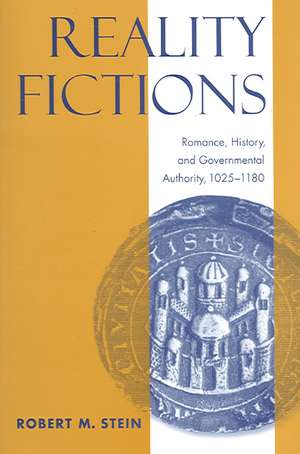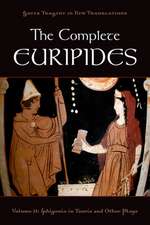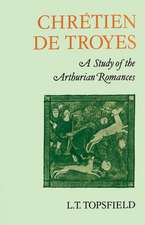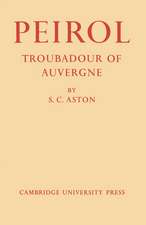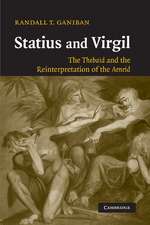Reality Fictions – Romance, History, and Governmental Authority, 1025–1180
Autor Robert M. Steinen Limba Engleză Paperback – 29 apr 2006
Preț: 241.01 lei
Nou
Puncte Express: 362
Preț estimativ în valută:
46.12€ • 47.98$ • 38.08£
46.12€ • 47.98$ • 38.08£
Carte tipărită la comandă
Livrare economică 15-29 aprilie
Preluare comenzi: 021 569.72.76
Specificații
ISBN-13: 9780268041205
ISBN-10: 0268041202
Pagini: 304
Dimensiuni: 154 x 230 x 25 mm
Greutate: 0.46 kg
Ediția:1st Edition
Editura: MR – University of Notre Dame Press
ISBN-10: 0268041202
Pagini: 304
Dimensiuni: 154 x 230 x 25 mm
Greutate: 0.46 kg
Ediția:1st Edition
Editura: MR – University of Notre Dame Press
Recenzii
"Stein explains how post-Norman Conquest texts of the 12th century reflect social issues regarding kingship and power. Basing his discussion on texts from 'border' areas that were sites of political unrest, the author begins with the writings of Gerard I, bishop of Cambria, exploring how his historical chronicles were used as political tools. . . Theoretically sophisticated and certain to be a groundbreaking work in Old French studies, this volume includes copious notes. Summing Up: Essential." —Choice
“This book is an exploration of the relationship between literary innovation and changing socio-political structures. Its four chapters cover the key literary genres of the Middle Ages: hagiography, historiography, romance, and epic, with four extended 'case studies' discussed in the book's four chapters. . . . It will certainly be a classic, and should be read by medievalists and non-medievalists, literary critics, and historians alike.” —Medium Aevum
“It is a tribute to this provocative and elegant study that it raises as many questions as it answers. Whether dealing with texts as familiar as Marie de France's Guigemar or as unfamiliar as the Latin life of St. Aubert, which remains untranslated and is available only in the eighteenth-century edition of the Bollandists, Stein's readings are subtle, persuasive, and-deliberately and commendably-inconclusive. . . offers the most convincing and complex account to date of the relation between epic, romance, and history in the long twelfth century.” —Speculum
“Lucid, vivid, consistently intelligent, and deeply informed in documentary and literary sources, Reality Fictions explains why writing the real mattered to diverse eleventh- and twelfth-century people. Stein shows how history, hagiography, epic, and romance developed together, constituting something of a cultural breakthrough for medieval Europe, which was built on a powerful social, political, and psychological platform.” —The Historian
“Reality Fictions offers a deft exploration of the complex relationships that underpin the cultural work of narrative expression in the eleventh and twelfth centuries. . . . The careful, well-crafted elucidations of Stein’s work never fail to test previous assumptions and spark further lines of inquiry. . . . This timely study yields an enjoyably challenging and original book that should serve as a model for informed, considered, and provocative literary history.” —Modern Philology
Notă biografică
Robert M. Stein is professor of language and literature at Purchase College, State University of New York, and adjunct professor of English and comparative literature, Columbia University.
Descriere
"The sense of being guided by a trustworthy intelligence, deeply grounded in knowledge based on thorough study of the relevant texts, in command of precise and accurate language, is the consistent experience of reading Reality Fictions. This is a genuinely original and important book." —Nancy Partner, McGill University
"Richly grounded in literary theory, Stein is never its captive; he knows when and how to allow the written text its rejoinder as theory's necessary corrective. Severe with unconsidered teleologies, always deeply contexted, this fine book abounds in conceptual payoffs. Among my revisionary favorites: his aptly titled (and wittily inverted) concluding chapter, 'From Romance to Epic.'" —Paul Strohm, Anna S. Garbedian Professor of Humanities, Columbia University
It has long been a commonplace of literary history that in the twelfth century, first in the French-speaking territories controlled by the Anglo-Norman and Capetian ruling families, and especially within the milieu of the English royal court, antique and chivalric romances appeared simultaneously with a new kind of historical chronicle driven by contemporary affairs. In short order, historiography and romance, whether written in Latin or in the vernaculars, became culturally dominant kinds of narrative expression throughout the rest of Europe.
Why did this happen? In Reality Fictions, Robert M. Stein argues that the emergence of historiography and romance was linked to large-scale transformations in the structure of power attendant on Capetian and Anglo-Norman state-making. He maintains that an understanding of the changes in twelfth-century romance and history writing requires us to consider the structure of literary production as a whole and in its relation to the world from which it emerges and to which it responds. A brilliant study of literary innovation, Reality Fictions provides a new understanding both of the large variety of overlapping institutional, epistemological, and practical structures of power that the European Middle Ages presents to us and of the ways in which dislocations and transformations of power are registered in the consciousness of those who live through them.
